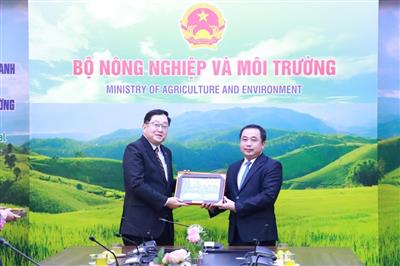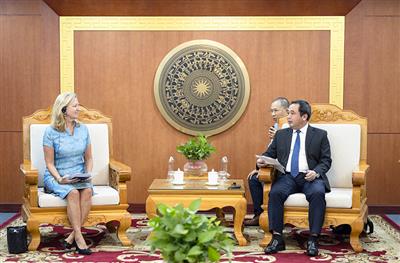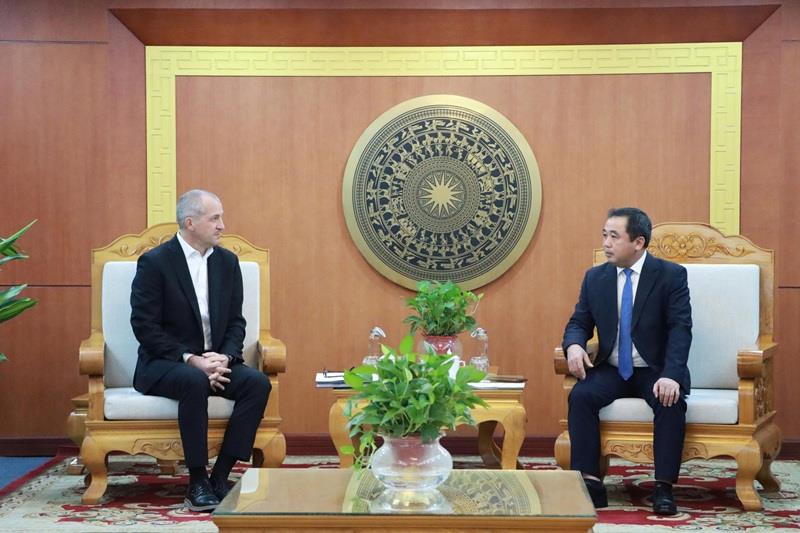
Vietnam advances climate adaptation monitoring to uphold national commitments
22/08/2025TN&MTOn August 21 in Hanoi, the Climate Change Department under the Ministry of Agriculture and Environment held a consultation workshop on the Draft Report on Monitoring and Evaluating Climate Adaptation Activities, along with the implementation plan for the monitoring and evaluation system. The event aimed to gather feedback to refine the two drafts and lay the foundation for scientifically and comprehensively tracking and assessing adaptation activities. The workshop also highlighted the sector’s persistent efforts to fulfill national commitments in responding to climate change.
Advancing climate adaptation efforts
In her opening remarks, Ms. Mai Kim Lien, Deputy Director of the Climate Change Department, emphasized the increasing severity and unpredictability of climate change, as well as its far-reaching impacts on livelihoods and sustainable development. She stressed that enhancing adaptive and resilience capacities is crucial, particularly for Vietnam, one of the countries most affected by climate change. According to Ms. Mai Kim Lien, the Vietnamese government has actively implemented numerous policies and international commitments to address this challenge.
Deputy Director of the Climate Change Department Mai Kim Lien stressed that strengthening resilience and climate adaptation is vital for Vietnam, one of the countries most severely affected by natural disasters
At the workshop, representatives from the Climate Change Department presented the 2024 monitoring and evaluation report on climate adaptation activities in agriculture and the environment. The 2024 report was developed based on key legal documents, including Prime Ministerial Decision 148/QĐ-TTg, Ministerial Decision 3442/QĐ-BNN-KH, and Official Dispatch 7902/BTNMT-BĐKH. The report aims to provide a comprehensive assessment of the year’s adaptation efforts and propose measures to enhance effectiveness, protect the environment, and promote sustainable development within the agricultural sector.
In 2024, the Ministry of Agriculture and Environment achieved positive results in policy development, issuing 14 documents and drafting 7 others. Key tasks were largely completed on schedule, particularly integrating climate change considerations into 13 major plans and strategies, such as the national forestry plan, fisheries exploitation plans, fish port systems, and storm shelter areas. International cooperation, public communication, and community awareness-raising were also prioritized.
Remaining challenges
However, the implementation process still faces significant challenges. Data on key indicators remain limited and are largely based on surveys. Legal frameworks and technical standards are incomplete, while human resources, especially at the local level, remain constrained.
The Climate Change Department under the Ministry of Agriculture and Environment held a consultation workshop on August 21 in Hanoi to refine drafts on climate adaptation monitoring, reaffirming Vietnam’s commitment to climate action
Adaptation models have yet to be widely scaled, and in some areas, communication efforts remain formalistic and not closely aligned with local needs. Infrastructure and equipment in remote areas are still inadequate, limiting the effectiveness of information dissemination.
Representatives from the Planning and Finance Department noted that data collection is hindered by factors such as complex indicators, small-scale agricultural production, limited budgets, and unsuitable survey techniques. Frequent staff changes also affect the stability of data collection and consolidation.
Technological solutions to support monitoring
During the workshop, the Climate Change Department introduced an online software tool designed to support the monitoring and evaluation of climate adaptation activities. This tool plays a critical role in helping agencies track, collect, and evaluate the effectiveness of adaptation measures clearly, promptly, and efficiently. The software also enhances management and coordination capacity, facilitates timely information updates, and supports periodic reporting, thereby improving the Ministry’s guidance and operational oversight.
At the workshop,Director of the Institute of Meteorology, Hydrology and Climate Change Pham Thi Thanh Nga underscored the need for clear, specific criteria to guide effective climate adaptation monitoring and reporting from central to local levels
In the discussion session, participants actively shared professional knowledge and practical experience in implementing climate adaptation monitoring and evaluation systems in different countries. According to Phạm Thị Thanh Ngà, Director of the Institute of Meteorology, Hydrology, and Climate Change, clear and specific criteria are essential to ensure effective implementation from central to local levels. These guidelines provide a foundation for agencies to clearly define report content and gain a holistic perspective on evaluating the effectiveness of adaptation activities.
The feedback collected from participants will serve as an important basis for the Climate Change Department to finalize the two drafts before submission to Ministry leadership for approval. This initiative is expected to accelerate the systematic and effective implementation of adaptation measures in the near future.
The workshop was regarded as a key milestone in building and improving the climate adaptation monitoring and evaluation system, clearly reflecting the Ministry of Agriculture and Environment’s commitment to fulfilling national obligations in response to global climate challenges.
Khanh Linh - Ngoc Huyen



















